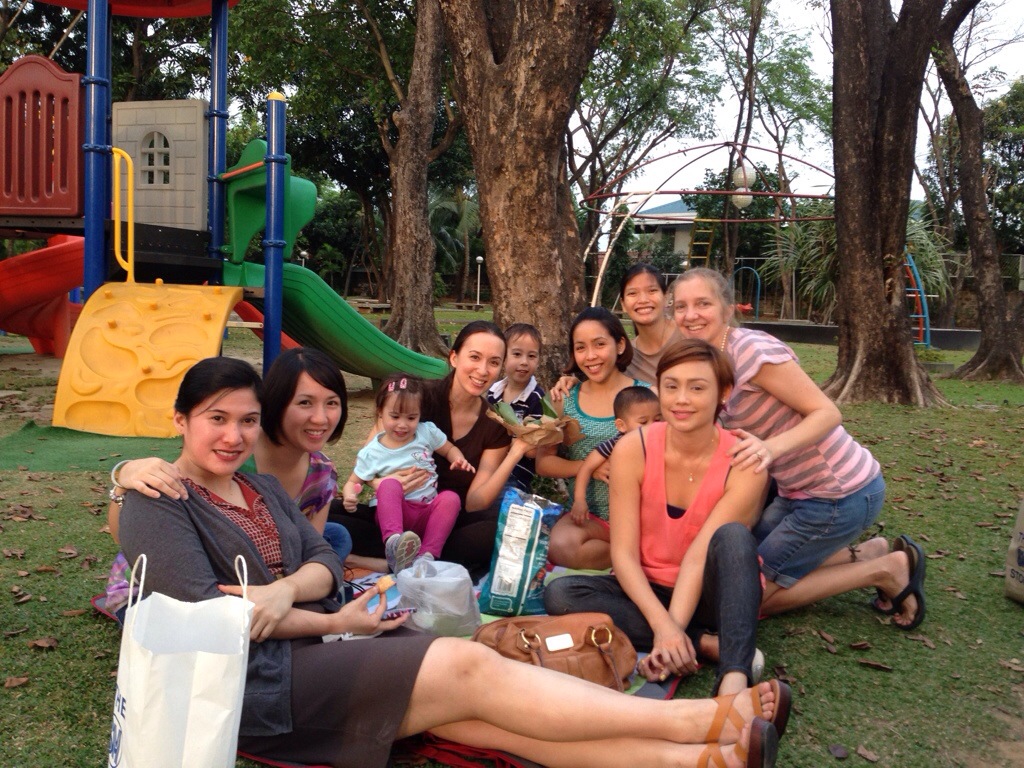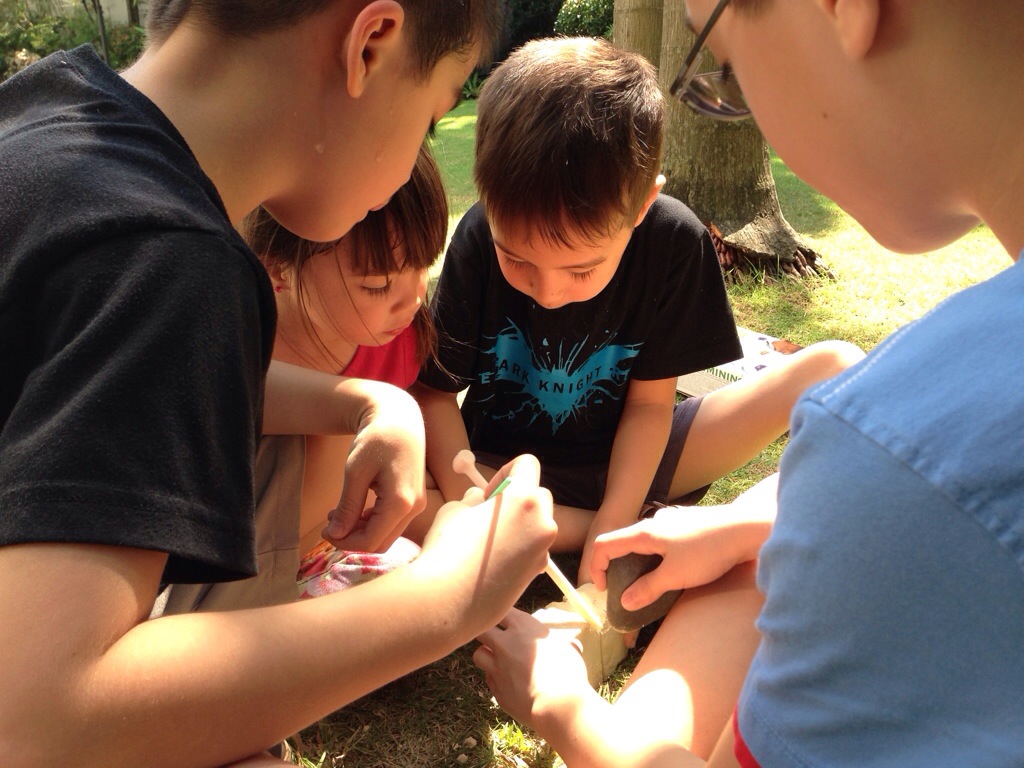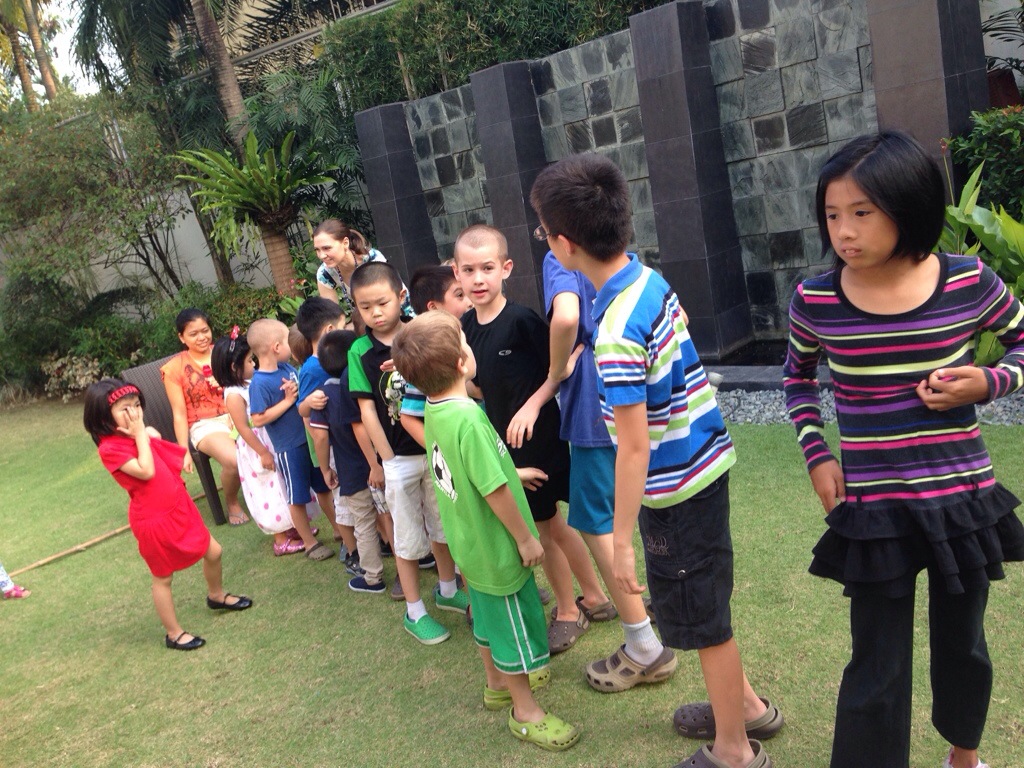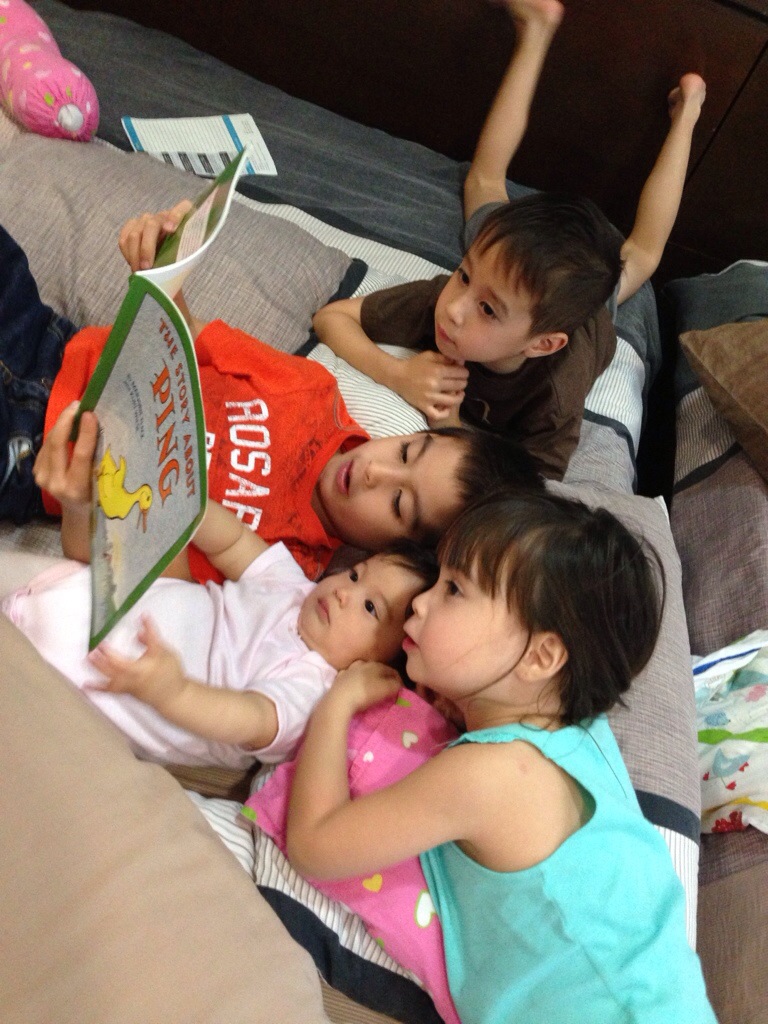Do homeschooled children know how to relate to other children? A lot of parents ask this when they are considering homeschooling.
From an outsider’s perspective, I get it. Homeschoolers seem weird. They are at home while most children sit in populated (and sometimes overpopulated) classrooms at school. To a certain extent, homeschoolers appear to be cut-off from daily contact with their peer-aged counterparts.
But over the years of homeschooling I have learned a couple of things about children and socialization, particularly homeschooled children and how they relate to others, that will dispel the notion that they are socially-starved.
Recently, I was having a conversation with my eldest son, Elijah, who shared that people who talk to him about homeschooling almost always ask if he has any friends.
Out of curiosity I asked, “What do you say?”
“I tell them I have SO many friends! I have playgroup and coop friends, friends in my music and pe classes, and bible study friends.”
Whew.
Most homeschoolers have a network of relationships like Elijah described. They may not have typical same age, uniform social class groupings that would be more common for school-based kids. Instead, they often have friends of varied ages and backgrounds who give them a richer context for social development.
In our playgroup, for instance, my kids interact with girls and boys ages 0 to 15 years old. We represent different ethnicities and we bring our kids together on a weekly basis. Our kids look forward to this time of socialization. And of course, as moms, we look forward to the fellowship. We are like a community of families with distinct heritages, experiences, values, and expertise. So our kids learn to adjust and get along with all kinds of people and accommodate what is not familiar, too.

I am not one of those homeschoolers who isolates her children from other kids. (Some families can be extreme, but most aren’t.) However, I am particular about whom they spend a lot of time with. Unlike a school, where parents can’t pick their children’s friends, homeschool parents can.
Some may argue that this isn’t representative of reality. Shouldn’t children learn to deal with the daily stress of bullies, peer pressure, and survival-of-the-fittest sort of scenarios?
Oh come on! Is there any parent who really believes this is going to do their child any good? Haven’t we instead seen good kids physically and emotionally wounded by the bad ones, and the bad ones spawn evil clones of themselves?
So no, I don’t think it is beneficial to subject my kids to that sort of daily social stress. Instead, I believe in teaching my children to respond appropriately and positively to people who are unkind and ill-mannered. Whether they are in school or not, my kids encounter bullies or socially disruptive sort of children. Edric and I explain to them that these kids probably don’t know Jesus and we ask our kids to model kindness and goodness to them. Since they aren’t perpetually subject to negative social experiences, they aren’t likely to adapt other children’s bad behavior or be harmed by them. But these instances give Edric and I enough of a chance to help our kids process what the proper, Christ-centered response ought to be.
I have to admit that it’s not easy to tell our kids not to fight back and take an eye for an eye. When Elijah was pushed by another child in Sunday School, I wanted to push that child over myself! Elijah was only one at the time and so was the girl that pushed him. As a first time mom many years ago I didn’t know that one year olds could be so cruel. Now that I have five kids, I know that folly is most definitely bound up in the heart of a child just as Proverbs says. My own kids pick on each other!
I also remember an instance when Edan was punched and chased by a kid in Active Fun. Edric happened to be there and he was so upset about it, he told the yaya of the boy to watch him closely. The kid still harassed Edan. By this time Edan was wailing and Edric told him to hit the kid back if necessary. (Not his proudest moment.) Edan didn’t want to but at a few moments later he jabbed the kid in the stomach in self-defense.
Edric also called out to Elijah, Titus and our nephews to protect one another and “put the kid in his place” if he went after any of them. This kid was like a wild animal. It turned out that he had special needs and Edric felt so guilty afterwards. He had a conference with our boys and nephews to address what happened and go over what should be done if they come across true bullies in the future.
But the point is, homeschool kids don’t have to be in school to experience the “real world.” In our family alone, our children are exposed to the realities of man’s fallen nature. They see our imperfections as parents. We all see one another’s imperfections and we must all practice forgiveness, long suffering and unconditional love — character traits that are indispensable to relating well with others.
My kids know that the world we live in isn’t rose-colored. But as early as now, we can teach our children to choose the right kinds of friends — friends who will cause them to love God more, who will encourage them to make wise choices that lead to blessing. If they experience what it is like to have meaningful relationships like these now, they will have a benchmark for what to look for in others when they are older. Of course the added benefit is we get to pass on to them how to develop godly convictions so they can influence others positively, too.
Relationships are important. God intended us to be in community — the family providing the first stable and secure relationship that our children need to experience. Afterwards, children can relate in healthy ways with others, and they ought to be given opportunities to do so. Children get to live out character traits in the context of interacting with others. My kids have to share when they play with their friends. They have to take turns and sacrifice their preferences. These are valuable lessons.
My son Edan doesn’t like mess and gets stressed whenever his friends come over and don’t clean up afterwards. Our family value is to leave a home arranged and not tornadoed by our five children. So when others don’t do the same, he feels upset. But I have talked with him about this. He is learning to be flexible and enjoy his friends without creating so many rules for how they will play with his toys or what rooms they can enter to play in.
Do kids need a lot of friends? Well, if you ask me I would say just give them more siblings. But that is me! My children are blessed to have one another.

When they aren’t together, they miss each other. On Tuesdays, Tiana is home without her brothers because they have their music, art and pe classes. She is 3 years old so a nap in the middle of the morning is strange. But, she is such a social child. When her brothers, aka playmates, are not around, she tells me, “I am sleepy.” And she will curl up on a bed and fall asleep!
There are homeschooled kids who can get lonely like Tiana does. To address this, parents can provide venues for their children to hang out with other kids. But trust me, kids don’t need 100 friends and they don’t need to be with them constantly.
I was just listening to a talk by Gerry Argosino, managing director of TMA Homeschool, who presented a very interesting topic on the commonalities between child geniuses. It was observed that these children didn’t frequently socialize with their peers so they tended to be more creative. Being alone pushed them to invent, play, design, and entertain themselves using their imaginations. While children benefit from friendships, they don’t need a classroom full of friends and they don’t need to be around them all the time.
Furthermore, even though children aren’t in daily contact with other kids doesn’t mean they can’t learn how to be friendly or acquire social skills. My kids go with Edric and I everywhere, as often as possible. This allows them to meet all kinds of people. It also means they get to practice manners and develop an appreciation for other cultures and traditions. We are right there with them so it’s hands on learning.
If we notice that they don’t acknowledge a person who asks them a question, we say things like, “Please look at them in the eyes and answer them. They are asking you a question.” If they act shy and self-conscious we show them how to be friendly. We don’t let them get away with ignoring people.
When Tiana was smaller she wouldn’t respond to people who tried to get her attention. So I would take her hand and say, “This is how you say hi,” and then I would wave it in the air. I didn’t say, “Oh she is shy.” In fact, when people would say that she was, I would respond, “No, she is not,” and make sure that Tiana would reciprocate a greeting in whatever way possible. Shyness, my mom used to say, is rooted in pride. It’s thinking of yourself. Well, at one point, Tiana started waving at everyone, even strangers! Sometimes she still gets self-conscious, but we are working on this.
Having five kids and dealing with their different personalities has taught Edric and I that it is our responsibility, as parents, to teach our children how to behave in social situations and how to treat others. Politeness and deference aren’t traits they will pick up automatically. They have to see these things modeled and demonstrated. They have to be guided and mentored.
For example, saying thank you when a sales clerk helps them find something…apologizing when they accidentally bump someone while walking…modulating the loudness of their voices…giving up their seat for an elderly woman…not running around like monkeys when they are in a mall (this is a hard one)…asking for permission before going into a room when they are house guests… including a kid who looks out of place…looking at a person in the eye when they are sharing a conversation with them, etc. Our children aren’t likely to learn these behaviors when they are with their friends. They may pick up some things here and there, but learning about social graces requires intentionality from parents.
A few weekends ago, while swimming in the pool there was a boy who didn’t have any friends. Our kids were busy entertaining each other. Edric and I saw the boy swimming all alone so we asked our sons to invite him to play. The boys gladly did so.
Edan swam up to him and asked what his name was. At first the boy seemed guarded but he warmed up as Edan engaged him in conversation, asking how old he was and what kinds of games he liked to play. Edan also called Elijah over and introduced Tiana and Titus to the boy. They had another homeschool friend, Santiago, who was friendly to the boy in the pool, too.
After a while, Edan was like, “do you want to play sharks and limmos?” (He meant minnows.) The boy said he didn’t know how to play it. But Edan assured him that he would teach him the rules.
The kids included the boy in our family game of sharks and minnows. Edric and I were the minnows and all the kids were the sharks.
I watched them interact with this boy but I was most blessed when Edan came up to me afterwards and asked, “Does he know Jesus?”
It wasn’t even something that had crossed my mind, but Edan was concerned. It’s one thing to be well socialized, to be able to get along with people. But it’s another thing to care about the spiritual condition of a person — to be purposeful about being friendly and kind to others so we can tell them how much God loves them…that he wants to have a personal relationship with them.
We need to impart to our children a higher reason for being well-mannered, kind, and considerate of others. For our family, the desire to reflect Jesus Christ and glorify him pushes us to look beyond what is comfortable or default-mode in us. We want to be a light and testimony that attracts other to Christ. Cultivating a good relationship with others ought to have as it’s intention the desire to connect them to the most powerful, amazing and loving person of all so they can enter into a life-changing relationship with Him! That’s what real socialization should be about!
And all of this is a gift from God, who brought us back to himself through Christ. And God has given us this task of reconciling people to him. For God was in Christ, reconciling the world to himself, no longer counting people’s sins against them. And he gave us this wonderful message of reconciliation. So we are Christ’s ambassadors; God is making his appeal through us. We speak for Christ when we plead, “Come back to God!” For God made Christ, who never sinned, to be the offering for our sin, so that we could be made right with God through Christ. (2 Corinthians 5:18-21 NLT)




I have always had special regards to parents who homeschools their children. I have seen the sacrifices and dedication they have in doing this. I’d like to thank you for giving me your personal experiences in the social aspect of homeschooled children as i, like many others, thought they lack social skills 🙂 knowing this made me wish i can also homeschool my kids in the future.
(I was surprised to see Mr.Argosino’s name in your write up. He’s the brother-in-law of my Tito)
He’s a great guy! We all appreciate him very much. Truly a man of God!
Hi Joy,
I think God just spoke to me through your blog! My daughter is 4 years old now and we are scouting for schools already. Many said we are late already but we are not ready yet emotionally to have our little girl be going out of the house without us! I think that’s helicopter parenting hehe Actually, we are not completely ready until now so I am seriously thinking about homeschooling her instead. This might caused me to give up my job though and my hubby is not into the idea of homeschooling since he said she is an only child and school could be her socialization avenue. I will let my hubby read your blog too and discuss this further with him. I really admire your parenting style but this will be a leap of faith when I decide to do homeschooling 🙂 Any further advice from you will be very much appreciated.
That’s great, Lyn! Pray about it though and wait for your husband to be absolutely okay with it. Getting his blessing on something like this is extremely important. You have to be one about this. Please email me if you have any questions about homeschooling. joytanchimendoza@gmail.com
Oh, Joy! This makes me want to homeschool my kids even more. I remember when Alexa was younger, and I was made to consult you and Edric on the matter (At Hannah’s party for Ethan). But I have to work, and didn’t know anyone in my area who had a co-op. And we moved out of Ortigas to North QC. 🙁 Wish I could still find a way to do so, even if I work full-time.
It’s still possible, Kaye. But you have to be real creative about it. If you can teach Alexa to be an independent learner you can even bring her with you! Well, I know I’m just mouthing things out and you really have to weigh the pros and cons for your situation. But, if God really wants you to do it, he will make a way. Otherwise, Alexa will be fine where she is at because she has a mom like you who is very intentional about raising her to love God!
Well said Joy… love your blogs. Would be an honor to meet your whole family some day. (: cl
Hi Colene! Great to hear from you. Praise God for the ministry you guys have!
Hi Joy. I’ve been battling shyness all my life and dont talk to people even when I really really want to. Lately God has been impressing in me 2 tim. 1:7 and more clearly today after reading what you said about shyness is rooted in pride. Next time I see you and your family in church can I say hi? 🙂
Please!!! Say hi!:)